Bayer process during the production of alumina Inorganic Amendments for the Remediation of Cadmium-Contaminated Soils
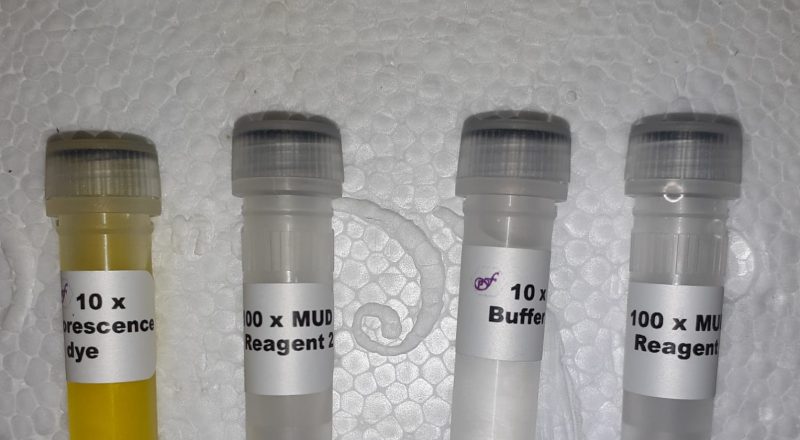
Red Mud
Red mud is a product of the Bayer process during the production of alumina (Hairi et al., 2015). As the temperature and pressure increases, the solubility of red mud decreases with sodium hydroxide (Nie et al., 2016). Its composition depends upon its parent material from which it is produced (Liu and Wu, 2012). It is present in the form of slurry having 10–30% solid materials (Milačič et al., 2012). Its pH ranging from 10.67 measured by Italian standard soil analysis 1:2.5 ratio and also has greater ionic strength (Hua et al., 2017).
Chemical analysis revealed that it contains silica, iron, calcium, titanium, and aluminum, and has minimal concentrations of elements such as sodium, potassium, chromium, nickel, zinc, copper, etc. Moreover, its chemical composition is given as follows:
Red mud is composed of minerals such as hematite, gibbsite, calcite, quartz, goethite, diaspore, rutile, kaolinite, etc. (Wang and Liu, 2012) measured using an X-ray diffractometer. The specific weight of red mud is 2.77 gcm – 3 measured by a gas pycnometer. According to the particle size distribution, it is a very fine material and has a high surface area (Wang and Liu, 2012).
Red mud has a greater sorption capacity than any other inorganic addition because it has a large amount of hydroxides that are used in the adsorption and precipitation mechanism to remove Cd from water, and it has a large amount of Al and Fe oxides (Wang et al., 2008a). At low pH, red mud works well in removing Cd from the soil (Liu et al., 2011). Cd is more available at low pH; red mud raises the pH and stabilizes the pH due to this Cd adsorption, which increases and decreases the bioavailability of Cd (Worden et al., 2009). The use of red mud to decontaminate Cd is therefore an effective and environmentally friendly technique (Panda et al., 2017).
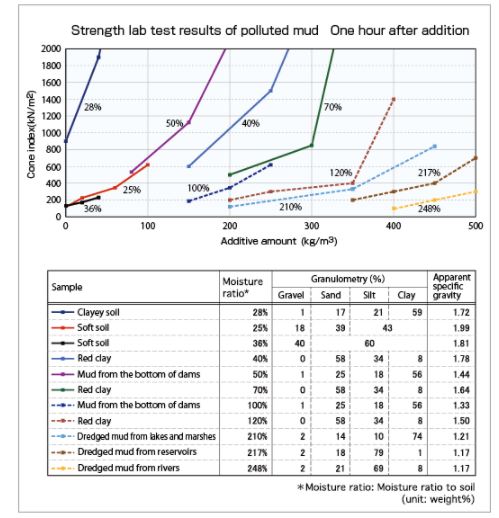
Anthropogenic Impacts
Though a colossal amount of red mud was discarded into the GOC for over half a century, effects on local marine food webs are unknown. Environmental concerns caused by disposal of red mud relate to its high alkalinity and sodicity (Paramguru et al., 2005; Power et al., 2011) and its documented hazards to sea life (Blackman and Wilson, 1973; Dauvin, 2010; Dethlefsen and Rosenthal, 1973; Pagano et al., 2002). Because red mud is a valuable resource that can be reused (e.g. Paramguru et al., 2005; Pontikes and Angelopoulos, 2013), systematic dumping of millions of tonnes at sea, let alone within a semienclosed Gulf such as the GOC, is not only hazardous but also wasteful.
High levels of metals were found in seagrass (Posidonia oceanica) from the Bay of Antikyra (Malea et al., 1994), an area where levels of polycyclic aromatic hydrocarbons in sediments, and concentrations of polychlorinated biphenyls (PCBs) and dichlorodiphenyl trichloroethane and its metabolites (DDTs) in Mediterranean mussels (Mytilus galloprovincialis) were among the highest sampled throughout Greece (Botsou and Hatzianestis, 2012; Tsangaris et al., 2010, 2011). In the present study, distribution modelling showed no strong correlation between red mud deposits and dolphin occurrence.
Because striped dolphins tend to be epi- and mesopelagic feeders and red mud dumping impacts predominantly the seafloor, avoidance would not be expected. However, indirect effects such as contamination up the food web are possible (Jepson et al., 2016). Bottlenose dolphins are primarily benthic feeders, and thus any use of the area is likely to result in direct and indirect exposure to toxic contaminants, with unknown health effects.
 isa cadmium | |||
| ISA22 | Consort | ea | EUR 109.2 |
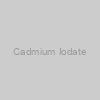 Cadmium Iodate | |||
| C00370 | Pfaltz & Bauer | 100G | EUR 501.27 |
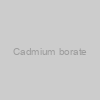 Cadmium borate | |||
| C00110 | Pfaltz & Bauer | 20G | EUR 173.57 |
 Cadmium iodide | |||
| GRM1354-100G | EWC Diagnostics | 1 unit | EUR 51.11 |
Description: Cadmium iodide | |||
 Cadmium iodide | |||
| GRM1354-500G | EWC Diagnostics | 1 unit | EUR 229.86 |
Description: Cadmium iodide | |||
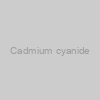 Cadmium cyanide | |||
| C00190 | Pfaltz & Bauer | 1G | EUR 193.5 |
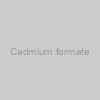 Cadmium formate | |||
| C00330 | Pfaltz & Bauer | 25G | EUR 118.95 |
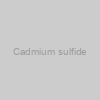 Cadmium sulfide | |||
| C00600 | Pfaltz & Bauer | 100G | EUR 244 |
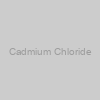 Cadmium Chloride | |||
| 06613-42 | NACALAI TESQUE | 25G | EUR 14 |
 Cadmium Chloride | |||
| 06613-71 | NACALAI TESQUE | 1G | EUR 9.8 |
 Cadmium Chloride | |||
| C059000 | Toronto Research Chemicals | 5g | EUR 64 |
Description: 10108-64-2 | |||
 Cadmium Sulphate | |||
| C059020 | Toronto Research Chemicals | 5g | EUR 58 |
Description: 10124-36-4 | |||
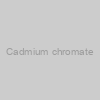 Cadmium chromate | |||
| C00180 | Pfaltz & Bauer | 100G | EUR 308.91 |
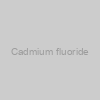 Cadmium fluoride | |||
| C00305 | Pfaltz & Bauer | 25G | EUR 150.78 |
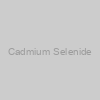 Cadmium Selenide | |||
| C00550 | Pfaltz & Bauer | 10G | EUR 146.55 |
 Cadmium selenite | |||
| C00560 | Pfaltz & Bauer | 5G | EUR 143.27 |
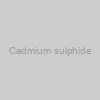 Cadmium sulphide | |||
| GRM4104-25G | EWC Diagnostics | 1 unit | EUR 142.05 |
Description: Cadmium sulphide | |||
 Cadmium sebacate | |||
| T30683-10mg | TargetMol Chemicals | 10mg | Ask for price |
Description: Cadmium sebacate | |||
 Cadmium sebacate | |||
| T30683-1g | TargetMol Chemicals | 1g | Ask for price |
Description: Cadmium sebacate | |||
 Cadmium sebacate | |||
| T30683-1mg | TargetMol Chemicals | 1mg | Ask for price |
Description: Cadmium sebacate | |||
 Cadmium sebacate | |||
| T30683-50mg | TargetMol Chemicals | 50mg | Ask for price |
Description: Cadmium sebacate | |||
 Cadmium sebacate | |||
| T30683-5mg | TargetMol Chemicals | 5mg | Ask for price |
Description: Cadmium sebacate | |||
 Cadmium Molybdate | |||
| C00430 | Pfaltz & Bauer | 100G | EUR 252.74 |
 Cadmium Phthalate | |||
| C00510 | Pfaltz & Bauer | 1G | EUR 277.7 |
 Cadmium telluride | |||
| C00620 | Pfaltz & Bauer | 10G | EUR 161.94 |
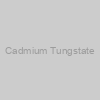 Cadmium Tungstate | |||
| C00640 | Pfaltz & Bauer | 5G | EUR 196.97 |
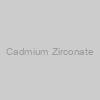 Cadmium Zirconate | |||
| C00650 | Pfaltz & Bauer | 100G | EUR 213.78 |
 Cadmium carbonate | |||
| GRM365-500G | EWC Diagnostics | 1 unit | EUR 39.95 |
Description: Cadmium carbonate | |||
 Cadmium telluride | |||
| GRM4674-10G | EWC Diagnostics | 1 unit | EUR 271.42 |
Description: Cadmium telluride | |||
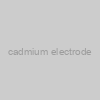 cadmium electrode | |||
| ISE22B | Consort | ea | EUR 422.4 |
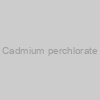 Cadmium perchlorate | |||
| C00500 | Pfaltz & Bauer | 25G | EUR 66.63 |
-Homo sapiens, similar to Alu subfamily SQ sequence contamination warning entry, clone IMAGE:5420280) LOC728032 (untagged)-Homo sapiens, similar to Alu subfamily SQ sequence contamination warning entry, clone IMAGE:5420280 | |||
| SC101868 | Origene Technologies GmbH | 10 µg | Ask for price |
 in Vaccines formulated in Alum, 48 tests, Quantitative) VacciGel Direct ELISA for the measurement of HCG (contamination) in Vaccines formulated in Alum, 48 tests, Quantitative | |||
| VAC-HCG-50 | Alpha Diagnostics | 1 Kit | EUR 927.6 |
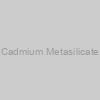 Cadmium Metasilicate | |||
| C00420 | Pfaltz & Bauer | 10G | EUR 235.32 |
 Cadmium Bar, 99.999% | |||
| GX4807 | Glentham Life Sciences | 250g | EUR 411.5 |
 Cadmium Bar, 99.999% | |||
| GX4807-250 | Glentham Life Sciences | 250 | EUR 361.7 |
 Cadmium Monocarbonate | |||
| C595033 | Toronto Research Chemicals | 10g | EUR 58 |
Description: 513-78-0 | |||
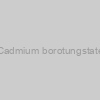 Cadmium borotungstate | |||
| C00120 | Pfaltz & Bauer | 5G | EUR 233.46 |
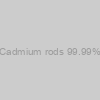 Cadmium rods 99.99% | |||
| C00071 | Pfaltz & Bauer | 100G | EUR 679.1 |
 Cadmium Shot 99.999% | |||
| C00072 | Pfaltz & Bauer | 50G | EUR 173.93 |
 cadmium orthophosphate | |||
| 20-abx186402 | Abbexa |
|
|
 Cadmium Stannate_x000D__x000D_ | |||
| C00570 | Pfaltz & Bauer | 100G | EUR 707.7 |
 Cadmium oxide, 99.999% | |||
| GX5303 | Glentham Life Sciences | 25g | EUR 565.75 |
 Cadmium oxide, 99.9% | |||
| GX6089 | Glentham Life Sciences | 100g | EUR 111.35 |
 Cadmium oxide, 99.999% | |||
| GX5303-100 | Glentham Life Sciences | 100 | EUR 449.7 |
 Cadmium oxide, 99.999% | |||
| GX5303-25 | Glentham Life Sciences | 25 | EUR 182.5 |
 Cadmium oxide, 99.9% | |||
| GX6089-100 | Glentham Life Sciences | 100 | EUR 113.1 |
 Cadmium Acetylacetonate | |||
| C00090 | Pfaltz & Bauer | 50G | EUR 368.13 |
 Cadmium carbonate_x000D__x000D_ | |||
| C00150 | Pfaltz & Bauer | 25G | EUR 192.91 |
